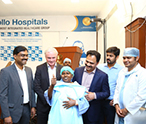The Cardiology department of Apollo Hospitals, Chennai has successfully performed India’s first minimally invasive Robotic Hybrid Revascularisation surgery on a 63-year-old female patient. The Robotic Minimally Invasive Hybrid Revascularisation is a procedure that combines minimally invasive coronary artery bypass grafting surgery (CABG) and angiography stenting procedure with Robotic assistance to achieve precision while treating patients with multi vessel coronary artery disease.
Mrs. J. Malliga, a 63-year-old lady from Ambattur (Chennai) was brought to Apollo Hospitals, Chennai on 18th February, 2018 with worsening chest pain that was persistent over 6 months. It was identified that she had blocks in two of the major blood vessels that supply blood to the heart. Patients with such severe blockage are mostly treated with a conventional Bypass surgery (by splitting the central chest bone) which is an intense procedure that needs a longer recovery time post-surgery, which is over three to four months.
Dr. M M. Yusuf – Cardiothoracic Surgeon who specialising in Minimally Invasive Cardiac Surgery at Apollo Hospitals and his team decided to use a minimally invasive technique rather than the traditional approach on the patient. This minimally Invasive-Hybrid Revascularisation procedure with Robotic assistance allows the surgeon to work on a beating heart through a small chest incision (small thoracotomy) without having to split the chest bone.
Dr. M M. Yusuf and his team performed this procedure with a unique two stage approach using Robotic assistance. Two of the three major blood vessel of the patient was severely blocked reducing the heart function completely. She also had blocks in other vessels, which could be treated either with surgery or angiography stent insertion. As the patient was not convinced of a conventional bypass, Dr. Yusuf performed the Minimally Invasive CABG using a robot under the guidance of Dr Frank Vanpraet, Director of Robotic and Minimally Invasive cardiac surgery, OLV Hospital, Aalst, Belgium. This procedure helped quick recovery and minimal morbidity.
Describing the procedure Dr. M. M. Yusuf – Cardiothoracic surgeon specialising in Minimally Invasive Cardiac Surgery, Apollo Hospitals said, “In the thoracotomy – beating heart approach, the surgeon can perform the operation through a tiny incision under the left nipple (four or five centimeters wide) while the heart continues to beat. This technique lowers the risk of complications that arises if a conventional bypass method is used. The patients have reduced pain and less need for postoperative pain medication, smaller scars, a shorter stay in the hospital and a faster recovery.”
He added, “As a stage two approach the patient underwent Angiography and Drug Eluting Stent insertion to the remaining blockages in the coronary artery under specialised Intravascular Ultrasound Guidance. This was performed by Dr. Damodharan, Senior Consultant Cardiologist, Apollo Hospitals, Chennai. The patient had excellent results in the check angiography after stent insertion and surgery. This patient was very cooperative and recovered in 48 hours and was discharged.”
Robotic assisted CABG is the least invasive method of minimally invasive cardiac surgery. Blood loss, pain is negligible and it reduces hospital stay with extremely quick recovery. This procedure would be suitable to treat many patients with multi-vessel coronary artery disease. Patients can return back to full normal activity within 2 weeks.
Dr. Mohammad Yusuf and team had earlier in March 2018 performed India’s first Minimally Invasive Hybrid Revascularisation procedure (without Robotic assistance) on a 53-year-old man saving him from a triple vessel blocks.




